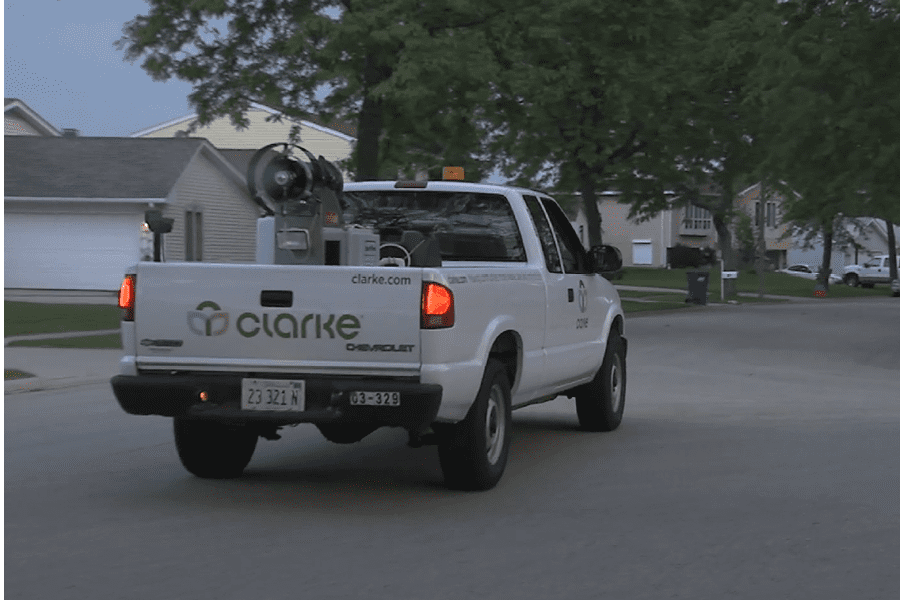Top 10 Questions Residents Have About Mosquito Control


Here are the top 10 things residents want to know about mosquito control spraying in their community. It’s important to note that the specific answers to these commonly asked questions might vary depending on the mosquito control product being used in your community. But generally:
Community-wide adult mosquito control treatments are performed using ultra-low volume (ULV) spray equipment that gets mounted to the back of a truck or all-terrain vehicle. ULV sprayers turn a liquid mosquito control product into an ultra-fine spray cloud or mist, made up of tiny droplets. These droplets move through the air with the wind at the time of the application to make contact with flying adult mosquitoes.
In order to be effective, the droplets need to make physical contact with the flying mosquito, so ULV applications usually start at dusk or dawn when local mosquito populations are most active. They do not have any residual effect – they work only at the time of treatment to quickly reduce adult mosquito populations. Once applied, the product begins to break down rapidly and dissipates 5 to 30 minutes later, depending on the formulation and weather conditions.
We understand that many residents are concerned about pesticide exposure in their everyday life. And, we know many individuals are generally sensitive to chemicals, whether they’re from a perfume or a pesticide, and take steps to limit exposure whenever possible. However, mosquito control treatments, applied correctly, using EPA-registered products, will not harm humans or pets and are an important practice for protecting the public from mosquito-borne diseases. That said, we do offer residents the ability to sign-up for advance notification of scheduled applications, so they can plan accordingly.
Plants and garden beds do not need to be covered or harvested before a treatment. Just use the same practice that should be followed with grocery or market produce, and rinse with water and a mild detergent before consuming.
Leave the A/C on! Windows may also remain open during a spray treatment but most residents do prefer to have them closed. Decades ago, these were common recommendations, but as application technology and product chemistries have evolved, this is no longer a necessary measure.
Insecticide applications are not one-size-fits-all, and spray treatments to reduce flying, biting, adult mosquito populations will not work on ticks. Why? Mosquitoes are flying; ticks are crawling; AND they are a completely different type of insect, with a very different body size. While the same product may be used for tick and mosquito control treatments, the application method and dose will be different. Applications for ticks need to be made at ground-level where they crawl, and with significantly higher doses of product than required for adult mosquito control spraying.
(Ahh… you were waiting for this one!) This one gets tricky and can be very product-specific, but generally, the answer is, have no fear! Download this fact sheet from the CDC that breaks down more details on mosquito spray applications. While the EPA has determined that certain active ingredients in pesticides may be toxic to beneficial insects upon direct exposure, four key things reduce this risk for mosquito control applications:
Mosquito spraying and bees – this is another sensitive issue and one that everyone in public health mosquito control takes very seriously. Firstly, the same protective measures followed to protect other beneficial insects also apply to bees, and mosquito control programs are encouraged to maintain transparent relationships with local beekeepers and provide advance treatment notifications. There has also been a lot of fieldwork and research published by very reputable academic institutions, such as Louisiana State University, that demonstrate mosquito control applications, when conducted according to all label guidelines, do not present a material risk to pollinators. For example, this article summarizing field research conducted by LSU demonstrates that ULV treatments for mosquito control do not harm honey bees, even in cases of direct spray applications.
Less – and quieter – is better! ULV spray technology has evolved quite a bit since the days of DDT fogger treatments. Modern chemistries, more advanced, quieter spray equipment, and variable weather conditions mean the spray cloud is not always visible or audible – but that doesn’t mean it’s not working!
Every Clarke application truck is equipped with two pieces of technology that ensure spray effectiveness and safety. First is a monitoring system called SmartFlow. This equipment adjusts spray volume as vehicle speed changes to ensure a uniform treatment rate. So, whether we are driving 5 or 15 mph, the right application rate is being dispersed. The second technology used is called GeoTab, which is a GPS-based application that tracks vehicle locations, vehicle speeds, and spray activity (on/off) in real-time.
The timing of spray treatments is always closely coordinated with the communities we serve and dependent upon the design of their mosquito control program and budget. To determine spray requirements, we look at population and disease monitoring data from surveillance traps in the local area, and combine it with insights from environmental conditions, predictive software, resident calls, and resource availability to time adult mosquito treatments to deliver the most relief.
Last but not least, ULV spray treatments followed by rain are usually still effective, as long as there were adult mosquitoes in flight at the time of treatment. However, the lasting power of barrier treatments sprayed on plant foliage can be compromised by weather conditions.